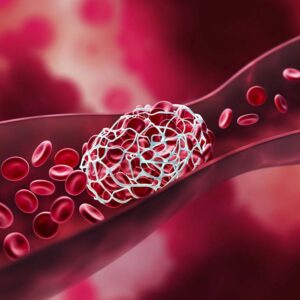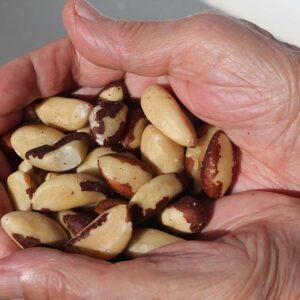
Potent Plant Extract Drives Down Dementia Risk
Dear Living Well Daily Reader,
Let’s face it. None of us is getting any younger.
And if you’re worried about losing your marbles as you age, you’re NOT alone.
It’s a common fear. And for good reason.
See, as you lose your memory, you slowly lose everything else, too. Your friends, your family, and your independence all begin to fade.
But if you’re hoping to find a solution behind the pharmacy counter, you’re out of luck. Because despite Big Pharma spending BILLIONS on Alzheimer’s research, the drug companies still have nothing to offer.
Thankfully, nature HAS supplied us with a way to help reverse your risk and keep dementia at bay. Because when it comes to Alzheimer’s disease, it’s all about prevention.
That means taking steps NOW to protect your brain BEFORE the disease takes hold. And new research has uncovered a way for you to do precisely that.
You simply need enough of a unique molecule hidden inside a common fruit.
I’m betting you’ve never heard of pelargonidin before. But I’m sure you ARE familiar with the tasty fruit brimming with this memory-supporting bioactive compound.
It’s delicious strawberries.
Research published in the Journal of Alzheimer’s Disease found that folks who consume more pelargonidin have fewer neurofibrillary tau tangles (plaques) in their brain.
The team discovered that pelargonidin decreases brain inflammation (neuroinflammation) and reduces the production of the cytokines that cause that inflammation.
Calming inflammation is critical because researchers think brain inflammation is one of the main reasons people get Alzheimer’s disease in the first place.
So go ahead and snack on more strawberries to boost your pelargonidin levels and dial down your dementia risk. But don’t stop there.
You can take plenty more drug-free steps to reduce your Alzheimer’s risk.
- Enjoy Your Coffee – Coffee contains a chemical called eicosanoyl-5-hydroxytryptamide (EHT) that was shown to protect against Alzheimer’s disease in animal studies. Other research supports the brain-health benefits of coffee.
- Tea Too – Green tea is a rich source of epigallocatechin-3-gallate (EGCG), which has been shown to reduce the beta-amyloid plaques and tau tangles that are linked to Alzheimer’s disease. Tea has also been linked to a drop in blood pressure and cholesterol levels, which is good for the brain.
- Get a Pet – According to researchers having a pet encourages you to be social and get exercise, which lowers Alzheimer’s risk.
- Embrace Color – Hit the produce aisle and eat the rainbow. Eating more colorful vegetables is associated with a slower rate of cognitive decline.
- Nap – Researchers at the Laboratory of Human Chronobiology at Weill Cornell Medical College in White Plains, New York, found that naps of all lengths enhance cognitive performance during the day.
- Exercise Hard (But Not Too Long) – In an Alzheimer’s study, volunteers who walked in six-minute vigorous intervals experienced better post-meal blood sugar levels than participants who did a once daily, moderate walking session. That’s important because blood sugar is closely related to brain health.
- Get Crafty – Researchers at the Mayo Clinic studied crafting activities—such as woodworking, pottery, ceramics, and quilting—and found they were linked to a 55% reduction in Alzheimer’s risk.
- Sprinkle in Some Spice – Cinnamon, turmeric, rosemary, and lavender help support brain health.
- Volunteer – Staying active and having a sense of purpose help people stave off the signs of Alzheimer’s.
Don’t delay. Taking steps to drive down brain inflammation and support a healthy brain starting TODAY could help you dodge dementia TOMORROW.
P.S. Pelargonidin isn’t the only produce-aisle extract that can help keep your brain healthy as you age. THIS powerful “citric element” helps whip your brain into shape too.
Source: ‘Pelargonidin and Berry Intake Association with Alzheimer’s Disease Neuropathology: A Community-Based Study’. 1 Jan. 2022: 653 – 661.
Written By Dr. Scott Olson, ND
Nearly 25 years ago, failed mainstream medical treatments left Dr. Olson in constant pain – and his health in ruins. And that’s when he did something REVOLUTIONARY. He began his career in medicine – and dedicated his life to uncovering the true, underlying causes of disease.
Through his innovative medical practices in Tennessee and Colorado, Dr. Olson has helped cure countless seniors from across America of arthritis… heart disease… diabetes… and even cancer. All without risky prescription drugs or painful surgeries.
View More Free Articles
Mailbag: Diarrhea Remedies That Really Work
“I have had diarrhea for 6 months. I’m going crazy and don’t know how to stop it! Please help!” – Can’t Stop Running Dear Can’t Stop, Few things disrupt life like battling a bout of diarrhea. Diarrhea is typically defined as having three or more loose, watery stools daily. If you experience this for over...
Take the SHORTER Path to Dramatically Better Health
Are you tired of fitness gurus preaching the virtues of 5 AM workouts and pushing Olympic-level training regimens? Their narrative can feel exhausting and entirely unattainable. But before you toss in the towel completely, I’ve got news that might just put a spring back into your step. A groundbreaking new study reveals that the key...
Unexpected Perks of Your Coffee Habit Revealed!
We all know that the first cup of coffee in the morning can FEEL like a lifesaver. But what if it might actually BE saving your life? A groundbreaking new study suggests that your daily coffee habit could be protecting you from not just one but multiple chronic diseases. Let’s pour over this fascinating research…...
The TRUTH About Diabetes Drugs and Brain Aging
You’ve probably seen the gushing headlines… Most say something like, “Common diabetes drug protects the brain against aging!” And let’s face it, that sounds fantastic. After all, who doesn’t want to keep their brain young and in tip-top shape? The headlines refer to the results of a new study that suggests the widely prescribed type...
Hidden Smartphone Danger Puts You at Risk
Remember when we thought cell phones were just something for young folks to obsess over? Back when we were convinced they were nothing more than a passing fad? Well, times certainly have changed. Now, most people… including many of us older folks… have jumped on the smartphone bandwagon. Heck, some of us are practically as...
Preserve Your Mobility with “Agile Aging” Exercises
Aging has a way of humbling us. You lose hair where you want to keep it—and often end up growing it where you don’t. With every passing year, your eyesight fades, and your waistline expands. And as your once quick pace begins to slow, you fear developing the dreaded “senior shuffle.” But here’s the thing....
Yes, Lazy Saturday Lie-Ins Can BOOST Your Health
Are you burning the midnight oil during the week and catching up on sleep on weekends? Well, I’ve got some news that might help you feel less guilty about those lazy Saturday mornings. A new study suggests that weekend lie-ins might be doing far more than just helping you feel refreshed. Experts say they could...
Mailbag: 7 Hidden Culprits Behind Your Weight Gain
“Why am I gaining weight, even though I am watching what I am eating?” – Battling the Bulge Dear Battling, Gaining weight when you’re not trying to is frustrating. And it just gets worse as we age… often regardless of our diet. The truth is that various factors can promote weight gain even when you’re...
Popular Artificial Sweetener Linked to Dangerous Heart Risk
Remember when erythritol was the darling of the health food world? Well, this popular sugar substitute might not be as sweet a deal as we were led to believe… A shocking new study reveals a dark side to this widely used artificial sweetener. It turns out erythritol is associated with a dangerous—and even deadly—heart risk....
Cracking the Code on Chronic Inflammation
Inflammation and obesity are the evil tag team at the heart of nearly every major disease we face—from diabetes to obesity. What starts as a normal, healthy process to fend off dangerous invaders can quickly fan into the flames of chronic inflammation… and that includes in your gut. The trouble is almost no one has...









